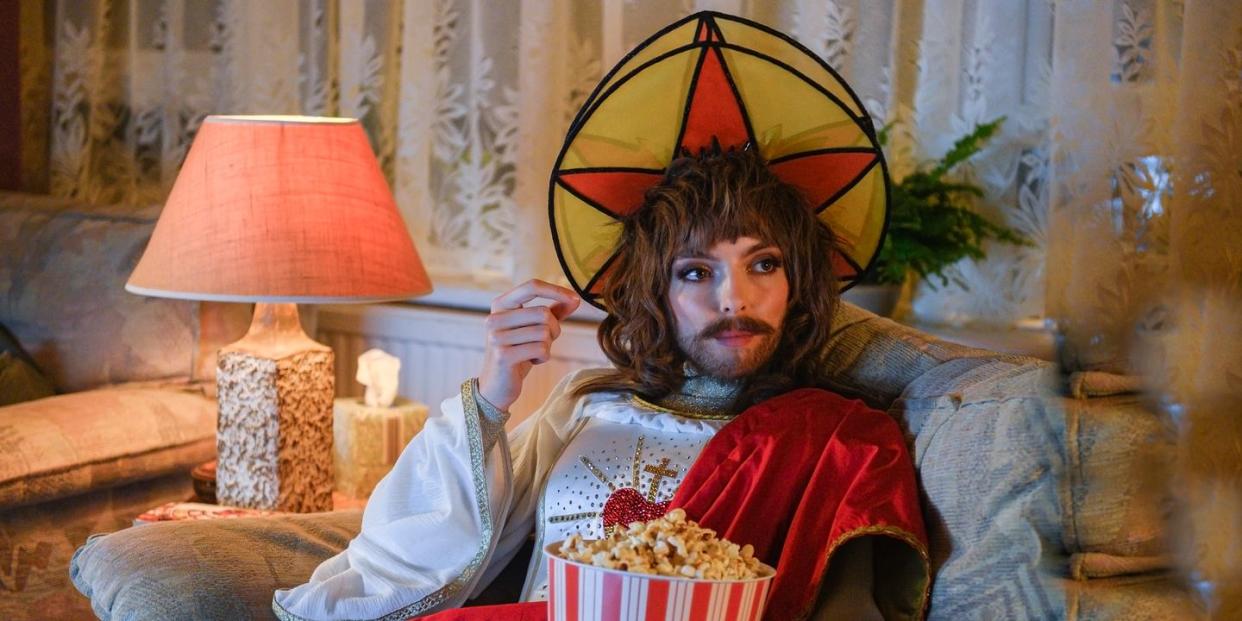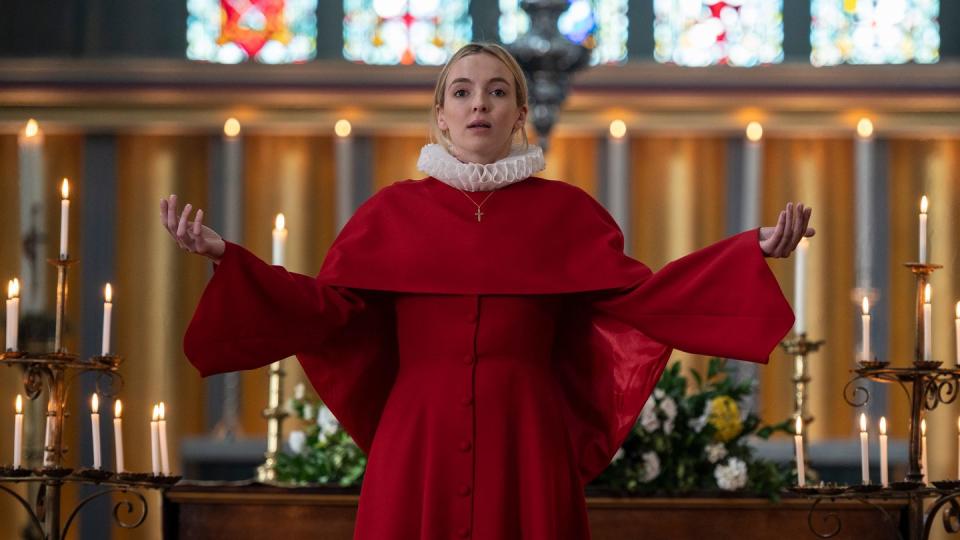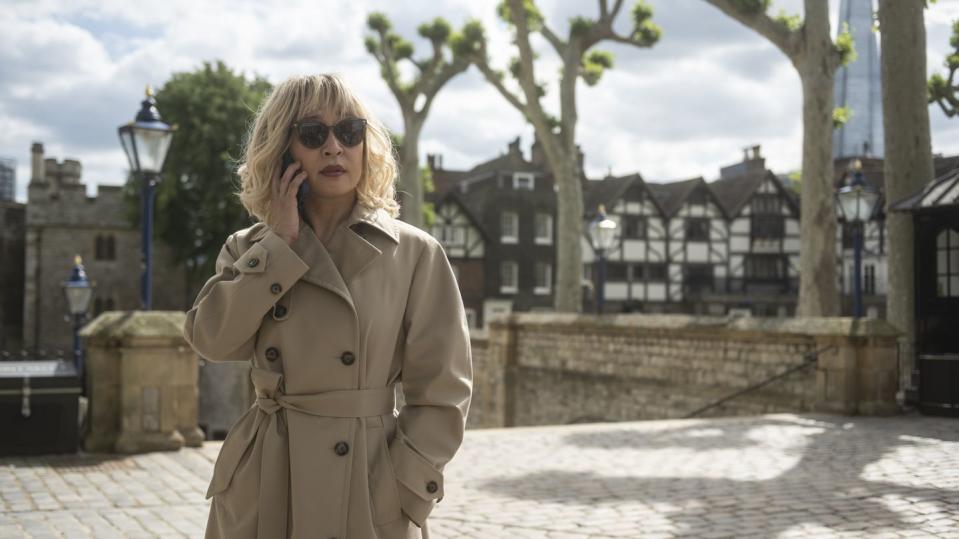Is Killing Eve's Villanelle Really Finding Her Religion?

- Oops!Something went wrong.Please try again later.
- Oops!Something went wrong.Please try again later.
- Oops!Something went wrong.Please try again later.
- Oops!Something went wrong.Please try again later.
The final season of Killing Eve is asking profound questions about its fashion-loving assassin, Villanelle: Does she have a moral compass? What is her sense of humanity at this point? And perhaps most significantly, what would she look like as Jesus Christ in drag?
In the season premiere, a vision of God appears to Villanelle, and as the spiritual being decked out in a robe and thigh-high boots later explains, "Everyone experiences me differently. I appear to some as an angel, to some as a voice in the clouds, and to some as a burning bush. But for you, I'm you in drag. Does that make sense?" Given Villanelle's narcissism—and her penchant for a flamboyant aesthetic—it does.
Ahead of tonight's episode, stars Sandra Oh (who plays Eve) and Jodie Comer (Villanelle) talked with T&C about shows use of religion and tease the fashions to come this season.
Villanelle’s baptism at the start of this season came as a surprise. What was your first reaction to that storyline?
Jodie Comer: Stunned. I was like, "Okay, this is new territory." I mean, it made complete sense in that she's so defeated by, strangely, people's view of her. I think in the past she wouldn't have cared. But she feels so oppressed by people telling her how bad she is and how she cannot change. Especially after season three with her mother, that really rocked her. So she definitely starts with a determination to prove everyone wrong.
Sandra Oh: I thought it was very daring. I thought it was very daring because there's a certain kind of crisis that happens within her.
JC: Oh, completely. She's really confronted by a side of herself that is so inherently bad that she cannot get away from it. And I've always said that she is her own worst enemy. I feel like she will be the one to get in her own way in the end. You can't escape yourself.
The first episodes of this season offer an interesting commentary on the performative nature of religion.
SO: I think that translates throughout the entire show, and definitely this last season. The nature of change—how is it performative? Is it authentic? And you see how both Eve and Villanelle are grappling with it, how they're either inside of that change or outside of that change. For Eve, what I like at the beginning of season four is actually you are seeing her physically changed. You see it from the very opening shot. She's doing things that I feel like you kind of always hoped that she would do and that she has in her—and now you're seeing it. So you see the physical change. You also see a—I don't want to say it was physical, but Villanelle is in different robes and she's really doing the performance of the rituals, but there's something that doesn't necessarily really stick.
JC: No, not at all, because I don't think it's coming from a truthful place. And she sees the power in the church, in the attention that this priest has in a sense of people listening and taking his guidance, the power that has, and control. So her reason for doing it gets swayed very, very easily because she wants to be good, and then being good actually becomes about having control. I feel like control has always been such a huge part of Villanelle. When she’s out of control is when she's most at unrest.

People love Villanelle’s fashions, and in the early episodes of this season, we don't see her over-the-top style as much. Will we see a return to the couture later in the season?
SO: Always, right?
JC: I'm trying to think of all the episodes. It does come back. I have to say though, the times when I get to wear socks and sandals, I am happy. It's like, okay, she's really integrated in the church. She's been here for a long time. She doesn't care about all these things anymore. And you get the fluffy socks and the Velcro sandals out. I'm like, "Oh yes, let's go."
SO: It's also balanced out that you see Eve having integrated certain things from Villanelle, like taking on personas, wearing disguises, also upping her fashion game a little bit. That was great to play. There is something slightly more balanced in the fourth season even in our characters' costumes.

Jodie, I have to ask you about playing drag Jesus. How did you prepare for those scenes?
JC: I don't know, to be honest. The whole experience was a blur. Honestly, it was about just going with it. The makeup was quite a process. And the tricky thing about that actually was we had to do the Villanelle vision at the end of the day because the makeup took so long. And sometimes we only had an hour to shoot those close ups, so a lot of it was just going for it, and knowing that it had to be flamboyant and exaggerated.
It was like imagining the worst part of Villanelle, trying to deceive her, and kind of lure her in. But also trying to portray, okay, what is she learning from this?
There's a kind of bit at the end of episode two, which was actually quite... it was quite emotional in a way when you see her kind of fighting with that side of herself. But I mean, the costume was incredible. I just couldn't take myself too seriously is the truth of it.
You Might Also Like

